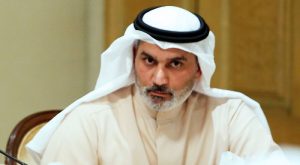The head of OPEC has urged members to reject any COP28 agreement that “targets” fossil fuels, highlighting deep divisions as the UN climate conference in Dubai enters its final week.

A new draft of the final agreement published on Friday, December 8, 2023, includes a range of options, from agreeing to a “phase out of fossil fuels in line with best available science”, to phasing out “unabated fossil fuels”, to including no language on them at all.
In a letter dated December 6 and seen by Reuters on Friday, OPEC Secretary-General, Haitham al-Ghais, urged OPEC members to reject any deal targeting fossil fuels rather than emissions.
“It seems that the undue and disproportionate pressure against fossil fuels may reach a tipping point with irreversible consequences, as the draft decision still contains options on fossil fuels phase out,” the letter, which referred to a draft of the text published on December 5, said.
“I avail of this opportunity to respectfully urge all esteemed OPEC Member Countries and Non-OPEC Countries participating in the CoC and their distinguished delegations in the COP28 negotiations to proactively reject any text or formula that targets energy i.e. fossil fuels rather than emissions,” it added.
Three sources confirmed the letter’s authenticity, Reuters said. OPEC did not immediately reply to a request for comment.
The nearly 200 nations gathered in Dubai are now expected to focus on the issue of fossil fuels in the hope of reaching a consensus before the gathering’s scheduled end on December 12.
Conference host the UAE urged delegates to set aside their differences to achieve a deal.
“Let’s please get this job done,” COP28 President, Sultan al-Jaber, said ahead of the release of the draft.
“I need you to step up, and I need you to come out of your comfort zones,” he added.
In a reaction, environmental watchdog, 350.org, described the OPEC step as a “possibility that would allow a series of maneuvers to postpone the elimination of oil, gas and coal and guarantee the continuity of the exorbitant profits of the companies in the sector.”
“We must not allow dangerous distractions to take over COP28. We must guarantee that the COP28 final text explicitly calls for the phaseout of fossil fuels,” submitted the group.
Cansın Leylim, 350.org Associate Director of Global Campaigns, said: “OPEC’s desperate resistance to a fossil fuel phaseout reveals their fear of a changing tide, evident in COP28 discussions. As 106 nations rally for a rapid fossil fuel decline, the draft text of the Global Stocktake offers hope with several options for a phaseout of fossil fuels.
“OPEC needs to get with the programme or move out of the way of our just transition to a 100% renewable energy powered future. COP28 was supposed to be the most inclusive of climate talks, yet fossil fuel lobbyists have found shelter, and are trying to block progress. The spotlight is now on the COP28’s Presidency and if they will broker a deal for a just transition or instead align themselves with the oil industry.”
Peri Dias, 350.org representative from Latin America at COP28: “The world is noticing Brazil’s juggling act to reconcile its image as a climate leader abroad while expanding oil and gas at home. The announcement of Brazil’s participation in the OPEC+ group and, now, the letter showing OPEC’s call to its member states to reject a fossil fuel phaseout at COP28 further highlights this contradiction.
“The double standard is burning the moral capital that President Lula built in this first year of his new mandate, thanks to his good measures to curb deforestation in the Amazon and rebuild environmental enforcement agencies after four years of the disastrous Bolsonaro government. His hesitation to leave fossil fuels in the past is undermining the country’s chances of leading the world in the environmental area, where it has the greatest potential for global projection.
“It will be much more productive if Brazil abandons this distraction and focuses on playing a more assertive role in the negotiations: It should push for the final text to mention a fast, funded, and full phaseout of fossil fuels. COP30 will be a great opportunity for Brazil to shine globally, but if the country does not use all its weight to advocate for a strong outcome at this year’s COP, it will be harder to achieve historic advances at the COP in Brazil in 2025.”
Romain Ioualalen, global policy manager of the advocacy group Oil Change International, said that the latest text “shows we have never been closer to an agreement on a fossil fuel phaseout.”
But he voiced alarm over “large loopholes” under consideration for the fossil fuel industry, predicting “a fierce battle over the next few days”.
Mohamed Adow, director of Power Shift Africa, said: “The text includes options explicitly calling for the phasing out of fossil fuels in line with the best available science. That’s clearly a positive step. The text also includes important recognition of fairness in regards to developing countries.
“The bare bones of a historic agreement is there. What we now need is for countries to rally behind the stronger of the options and strengthen them further.”
Climate campaigners have viewed al-Jaber’s presidency with suspicion, due to his position as head of the UAE national oil firm ADNOC.
But he has sought to reassure doubters by stating that a phase-down of fossil fuels, if not necessarily a complete end, is “inevitable” and the summit last week reached a quick agreement on another key area – a loss and damage fund, which will assist nations devastated by climate change.
At least 80 countries are demanding a COP28 agreement that calls for an eventual end to the use of fossil fuels, as scientists urge ambitious action to avert the worst impacts of climate change.
Such a position would be unprecedented, after three decades of UN climate summits that never addressed the future of fossil fuels head-on, even though they are the top source of planet-warming emissions.
